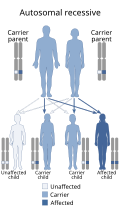Galactose epimerase deficiency: Difference between revisions
CSV import |
CSV import |
||
| Line 26: | Line 26: | ||
{{stub}} | {{stub}} | ||
<gallery> | |||
File:UDP-glucose.png|UDP-glucose structure | |||
File:Autosomal_recessive_-_en.svg|Autosomal recessive inheritance pattern | |||
File:Complete_galactose_metabolism.png|Complete galactose metabolism pathway | |||
</gallery> | |||
Revision as of 03:50, 18 February 2025
Galactose epimerase deficiency is a rare genetic metabolic disorder characterized by the body's inability to convert galactose to glucose. This condition is caused by mutations in the GALE gene and is inherited in an autosomal recessive manner.
Symptoms
The symptoms of galactose epimerase deficiency can vary greatly from person to person. Some individuals may have no symptoms, while others may experience severe complications. Common symptoms include failure to thrive, jaundice, liver disease, kidney failure, cataracts, and intellectual disability.
Causes
Galactose epimerase deficiency is caused by mutations in the GALE gene. This gene provides instructions for making an enzyme called galactose epimerase, which is involved in the process of converting galactose to glucose. Mutations in the GALE gene disrupt this process, leading to the accumulation of galactose in the body.
Diagnosis
The diagnosis of galactose epimerase deficiency is typically made through a combination of clinical examination, biochemical testing, and genetic testing. Biochemical testing can detect elevated levels of galactose in the blood, while genetic testing can identify mutations in the GALE gene.
Treatment
There is currently no cure for galactose epimerase deficiency. Treatment is focused on managing the symptoms and preventing complications. This may involve a galactose-free diet, medications to manage symptoms, and regular monitoring of organ function.
Prognosis
The prognosis for individuals with galactose epimerase deficiency varies depending on the severity of the condition. Some individuals may live a normal life with few symptoms, while others may experience severe complications and have a reduced life expectancy.




